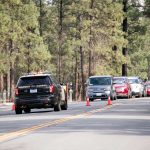Like a puff of smoke from a magician’s hat, the state fire fee has already been raised before anyone has paid the original fee announced in August.
On Nov. 8, a restocked state Forestry Board voted 6-2 to replace the $90 annual fee (approved in August) with a new fee set at $150. Property within a local fire district will receive a $35 reduction. The total fee for Idyllwild Fire Protection District property will be $115, plus $25 for each additional habitable structure.
These additions came about after the governor changed the board membership, noted State Senator Bill Emmerson (R-37). “I think the governor is totally committed to establishing this fee. It’s highly unlikely you’ll see any changes from the legislature. I think the governor would veto the measure.”
In October, Gov. Jerry Brown appointed four new members to the board. In August, the Board had set the maximum fee at $90 with a $45 reduction for local fire districts.
Pine Cove and Mountain Center residents will pay the basic $150 plus the fees for additional structures.
“My biggest concern is there is no ability to carve out fire protection districts, like Idyllwild,” Emmerson said.
“The mountain community of Idyllwild is being illegally taxed,” opined Jeff Stone, Riverside County 3rd District supervisor. “The state refuses to address its own spending. But if walks and talks like a tax, it’s a tax.”
The revenues are supposed to support the California Department of Forestry and Fire Protection’s prevention budget. When the legislature enacted the fee in July, $50 million was the original estimate for collections.
The funds will be deposited in a Fire Prevention Fund, which the Forestry Board may use to award grants to local agencies such as fire protection districts and fire safe councils for fire prevention services. The amount of the grants will be dependent upon the fees collected in that county, according to the new regulations.
The funds may be used for preparing or modifying a community wildfire protection plan, a local hazard mitigation plan, fire safe regulations, community fuel reduction projects (in state regulated areas), fire prevention education and other fire safety and prevention projects.
In 2003, the Legislature enacted an annual state fire fee, but opposition quickly mounted and the legislation was repealed before any money was collected.
After the August fee was enacted, the Howard Jarvis Taxpayers association threatened to sue; but they must wait until someone pays their tax bill before filing any litigation.
Emmerson also stressed that the legislative intent of the bill was to collect the fees for prevention activities. To the extent the money supplements fire suppression or firefighting activities, he believes that will increase the legislation’s vulnerability to successful litigation.










